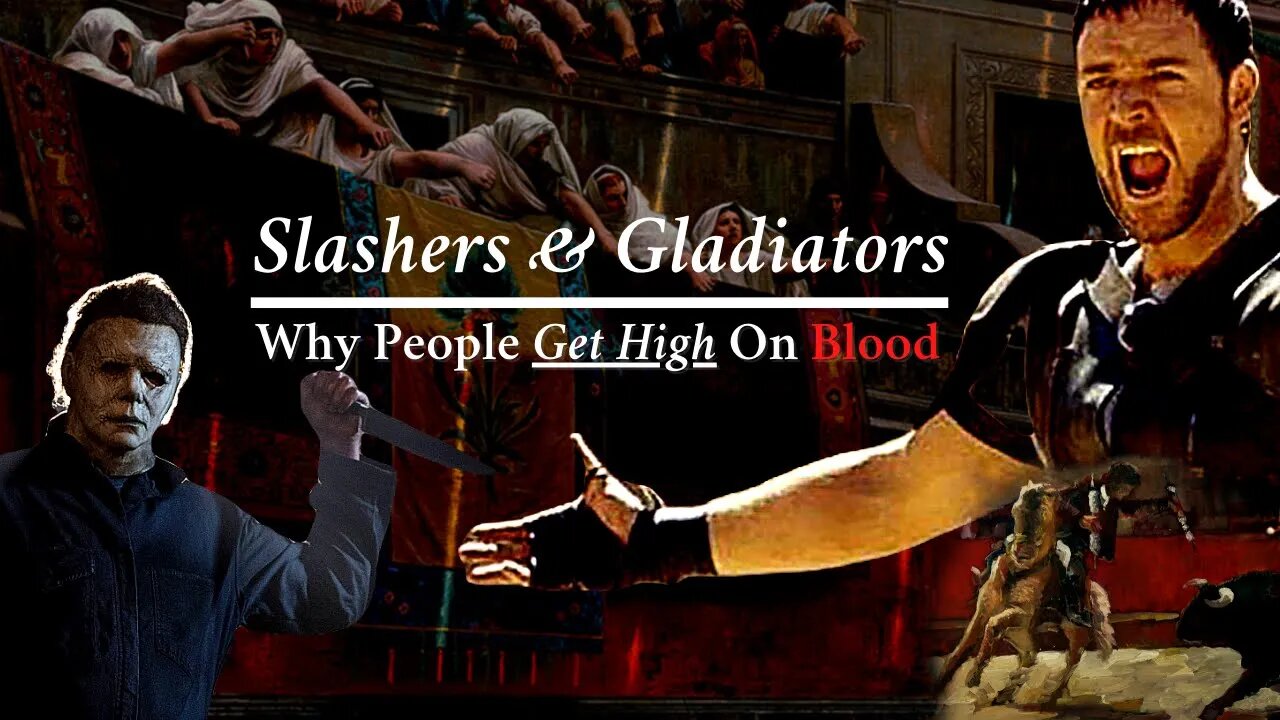Premium Only Content

Why People Love GRUESOME Gladiator Sports & HORRIFIC Films | Aesthetic Vulnerability & the Sublime
Our lives are sheltered from the reality of death, for the most part. But in ancient Rome, death & killing were the premiere forms of entertainment. Contemporary accounts from writers like Saint Augustine, Seneca, Cicero, and others corroborate the fanatic blood-lust of the Roman people. Massive, frenzied crowds gathered to watch gladiators fight to the death and enemies of the state literally torn apart by wild animals and a form of execution-turned-entertainment.
This may seem barbaric to us, but the reality is that modern audiences are still entertained by death in the form of horror movies, particularly slasher and splatter films. The 70s and 80s produced killer icons like Jason Voorhees, Michael Myers, Freddy Krueger and others. The 2000s saw the rise of the SAW franchise, a further popularization of gore-based entertainment.
Why are people drawn to the spectacle of death and killing?
I think the best answer comes from Ernest Hemingway's book on the Spanish bullfights, Death in the Afternoon. Hemingway had to explain to English audiences the rationale for this kind of brutal entertainment: killing bulls, or watching men genuinely risk their lives for fun. He concluded that watching the fights gave the audience a sense of life, death, mortality, and immortality. It makes you feel things you don't experience in everyday life. It makes life feel real. It gave the Romans who watched a sense of rapturous immortality which they craved. The same is true of horror films. By watching people play with death, narrowly avoiding it, or even falling victim to it, one gets a profound sense of life and death, that we don’t have in our days at the office or factory, or binging Netflix.
This mixture of terror, dread, and gloom with joy, rapture, and satiation is what the Romantic Era Philosophers—Friedrich Schiller, Edmund Burke, Arthur Schopenhauer, et al.—called The Sublime, a term which comes from the Latin word sublimis which means to be elevated or lifted up, or high—it’s the feeling of being on a mountain, or on rooftop, the feeling of greatness, and vastness, and incalculable magnitude, which comes from terrors and dangers.
I think all of this has profound implications for life, and how we understand human nature, and what it means to live a meaningful life as a human. Risk is something we need. Philosophically we tend to treat suffering and evil as defects in the fabric of the universe. But The Sublime suggests that hazard is not a defect. Rather it’s a necessary condition to meaningful existence.
I think the Genesis account of the Garden of Eden is unbelievably profound when it describes the ideal perfect paradise as a place which must be “cultivated and kept,” a Hebrew word meaning to watch over or guard or protect. Protected it from whom? Presumably the serpent, the dragon who shows up later. At any rate. The takeaway is that a perfect world is not a world without threats, but a world in which there are threats to fight against. the perfect paradise has dragons. The ideal man, fashioned directly by God, is a man who, like a protagonist in a horror film rages against true and powerful evil.
G.K. Chesterton made the point that evil, even powerful evil, is necessary for a beautiful world, because we must have something to fight against. Philosopher William James went even further when he argued in his lectures on Pragmatism that we can only take life seriously when it is dangerous, and when we accept that we must inevitably suffer loss and sacrifice. Life is meaningful only when the stakes are high. It’s adventurous only when we might lose. But the fact of loss doesn’t mean we shouldn’t play, for as James says, quoting an Ancient Greek epigram:
“A shipwrecked sailer, buried on the coast,
Bids you set sail.”
#Gladiator #Horror #Philosophy #History #Cinema
-
 31:20
31:20
Empire of the Mind
2 years agoTHE MEANING of A CLOCKWORK ORANGE: How Government & Science Threaten to Pervert Human Beings
507 -
 21:35
21:35
DeVory Darkins
3 days ago $4.04 earnedMitch McConnell TORCHED as Secretary of HHS is sworn in
7.94K88 -
 1:20:04
1:20:04
Tim Pool
4 days agoGame of Money
23.9K9 -
 2:21:11
2:21:11
Nerdrotic
8 hours ago $12.94 earnedDown the Rabbit Hole with Kurt Metzger | Forbidden Frontier #090
67.3K17 -
 2:41:13
2:41:13
vivafrei
13 hours agoEp. 251: Bogus Social Security Payments? DOGE Lawsduit W's! Maddow Defamation! & MORE! Viva & Barnes
205K249 -
 1:19:23
1:19:23
Josh Pate's College Football Show
6 hours ago $2.14 earnedBig Ten Program Rankings | What Is College Football? | Clemson Rage| Stadiums I Haven’t Experienced
49.6K1 -
 LIVE
LIVE
Vigilant News Network
12 hours agoBombshell Study Reveals Where the COVID Vaccine Deaths Are Hiding | Media Blackout
1,792 watching -
 1:17:59
1:17:59
Sarah Westall
7 hours agoDOGE: Crime & Hysteria bringing the Critics & the Fearful - Plus new CDC/Ukraine Crime w/ Dr Fleming
31.2K3 -
 45:39
45:39
Survive History
13 hours ago $3.76 earnedCould You Survive in the Shield Wall at the Battle of Hastings?
38.7K5 -
 1:50:28
1:50:28
TheDozenPodcast
12 hours agoViolence, Abuse, Jail, Reform: Michael Maisey
82.3K4